As US President Donald Trump ratcheted up economic pressure on China over the past week, Beijing sent back its own message: Its rise won’t be interrupted.
美国总统唐纳德·特朗普过去一周加大对中国的经济压力,北京方面则回击道:中国的崛起不会受到阻挡。
A major political meeting taking place in the capital was the ideal backdrop for Beijing to respond. The “two sessions” gathering of China’s rubber-stamp legislature and its top political advisory body is where the government reveals its plans and sets the tone for the year ahead.
在首都举行的一次重要政治会议是北京作出回应的理想背景。中国立法机构和最高政治顾问机构“两会”是政府公布计划并为来年定下基调的地方。
The top item on its priority list? Boosting consumer demand to ensure China doesn’t need to rely on exports to power its vast but slowing economy. And the next: driving forward leader Xi Jinping’s bid to transform the country into a technological superpower, by ramping up investment and enlisting the private sector.
其首要任务是什么?刺激消费需求,确保中国不需要依赖出口来推动其庞大但放缓的经济。其次,通过增加投资和吸引私营部门,推动领导人习近平将中国转变为技术超级大国的努力。
Beijing is making these moves as it prepares for what could be a protracted economic showdown with the United States. Trump doubled additional tariffs on all Chinese imports to 20% on Tuesday and has threatened more to come – as well as tighter controls on American investment in China.
北京采取这些举措,是为了准备与美国进行一场可能旷日持久的经济摊牌。特朗普周二将所有中国进口商品的关税提高一倍至 20%,并威胁将进一步加征关税,同时将加强对美国在华投资的控制。
“We can prevail over any difficulty in pursuing development,” China’s No. 2 official Li Qiang told thousands of delegates seated in Beijing’s Great Hall of the People at the opening meeting of the National People’s Congress Wednesday. The “giant ship of China’s economy” will “sail steadily toward the future,” he said.
中国二号人物李强周三在全国人民代表大会开幕式上对在北京人民大会堂就座的数千名代表说:“我们能够战胜发展道路上的任何困难。”他说,“中国经济这艘巨轮将稳步驶向未来”。
A foreign ministry spokesperson was more direct when asked about trade frictions on Tuesday: “If the US insists on waging a tariff war, trade war, or any other kind of war, China will fight till the end,” he told reporters.
周二,当被问及贸易摩擦时,外交部发言人的回答更加直接:“如果美方执意发动关税战、贸易战或任何其他战争,中方将战斗到底,”他告诉记者。
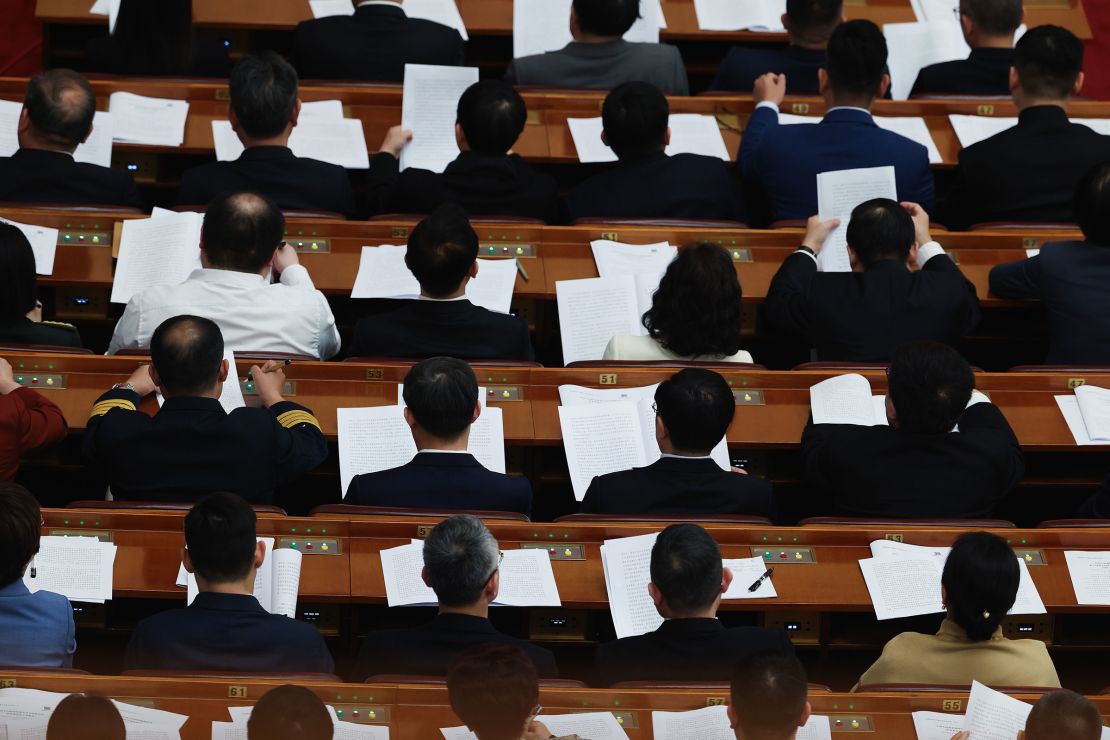
And while Beijing’s priorities – and rhetoric – may echo those of years past, this time they are coming from a country that is starting to regain its swagger after being battered by its own Covid restrictions, a property sector crisis and by a tech war with the US.
尽管北京方面的优先事项和言论可能与过去几年相似,但这一次,中国在遭受自身新冠疫情限制措施、房地产行业危机以及与美国的技术战的打击后,正开始恢复活力。
“Confidence” has been an unofficial buzzword of the weeklong event, which ends Tuesday. It was used nearly a dozen times during a press conference held by China’s economic tsars on Thursday, splashed across state media coverage and included in a pointed reminder – that “confidence builds strength”– during the closing lines of Li’s nationally broadcast speech.
“信心”是本周二闭幕的为期一周的峰会的非官方流行语。周四,中国经济“沙皇”召开的新闻发布会上,这个词被用了近十几次,在国家媒体的报道中也随处可见,李克强在全国广播讲话的最后,还强调了“信心铸就力量”。
That optimism might be more aspiration than reality. Many in China are looking to the future with uncertainty. They’re more willing to save than spend, while young people are struggling to find jobs and feeling unsure whether their lives will be better than those of their parents.
这种乐观可能更多的是一种愿望,而不是现实。中国许多人对未来都抱有不确定性。他们更愿意储蓄而不是消费,而年轻人则在努力寻找工作,不确定他们的生活是否会比父母的生活更好。
But unlike last year, the country is entering 2025 buoyed by the market-moving successes of Chinese firms and technology. And while Trump’s return has Beijing concerned about economic risks, it’s also eyeing opportunity for its own rise.
但与去年不同的是,中国正迈入 2025 年,这得益于中国企业和技术在市场中取得的成功。尽管特朗普的回归让北京担心经济风险,但它也在寻找自身崛起的机会。
“By the end of Trump’s second term, America’s global standing and credibility image will have gone down,” People’s Liberation Army Sen. Col. (ret) Zhou Bo, a senior fellow at Tsinghua University’s Center for International Security and Strategy in Beijing, told CNN. “And as American strength declines, China, of course, will look more important.”
“到特朗普第二任期结束时,美国的全球地位和可信度形象将下降,”中国人民解放军退役上校、清华大学国际安全与战略研究中心高级研究员周波告诉 CNN。“随着美国实力的下降,中国当然会显得更重要。”
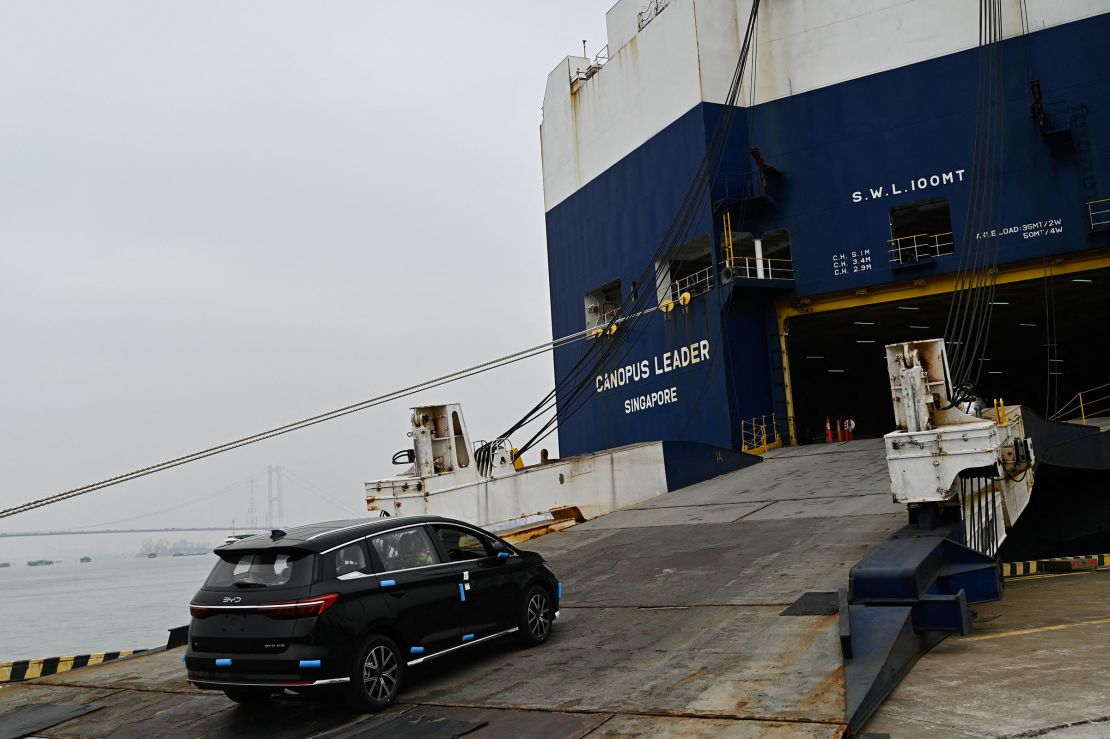
Confidence boost 信心增强
This mood isn’t just percolating in the halls of power.
这种情绪不仅仅在权力殿堂中蔓延。
On the streets of the capital, gleaming homegrown electric vehicles weave through traffic, including those from carmaker BYD, which now goes toe-to-toe with Elon Musk’s Tesla for global sales – a reminder of China’s successful push to become a leader in green tech.
在首都的街道上,闪闪发光的国产电动汽车穿梭在车流中,其中包括比亚迪汽车公司的汽车,目前比亚迪汽车在全球销售方面与埃隆马斯克的特斯拉汽车展开了激烈竞争——这提醒人们中国已成功成为绿色科技的领导者。
Then there’s the box office record-smashing animation “Ne Zha 2” and the breakout success of privately owned Chinese AI firm DeepSeek. Its large language model shocked Silicon Valley and upended Western assumptions about the costs associated with AI.
然后是票房创纪录的动画片《哪吒2》 ,以及中国民营人工智能公司DeepSeek的突破性成功。它的大型语言模型震惊了硅谷,颠覆了西方对人工智能相关成本的假设。
In Beijing this week, “you can ask DeepSeek” has been a playful and proud punchline in casual conversation.
本周在北京,“你可以问DeepSeek”成为了闲聊中一个俏皮而自豪的笑料。
“Last year, people may have been impacted by the US narrative that China is declining, that China has peaked,” said Wang Yiwei, director of the Institute of International Affairs at Renmin University in Beijing. “We still have many difficulties. We still have many problems, of course, but it’s not that we’ve reached peak China.”
“去年,人们可能受到了美国关于中国正在衰落、中国已达到顶峰的说法的影响,”中国人民大学国际问题研究所所长王义桅表示。“我们仍面临许多困难。当然,我们仍面临许多问题,但这并不意味着我们已经达到中国顶峰。”
Even Trump’s focus on economic rivalry with Beijing as he rolls out tariffs on US trade partners appears to some as a mark of how far China has come. On a recent weekday afternoon in downtown Beijing, some passersby interviewed by CNN pointed to competition with the US as a sign of their country’s growing strength.
“China is developing quickly now and that’s attracted international attention, especially from the United States,” but that may not be a bad thing, said a medical graduate student surnamed Xia. “Trump’s increase on tariffs is competition … (and) if there’s no competition maybe China’s independent development is not sustainable.”
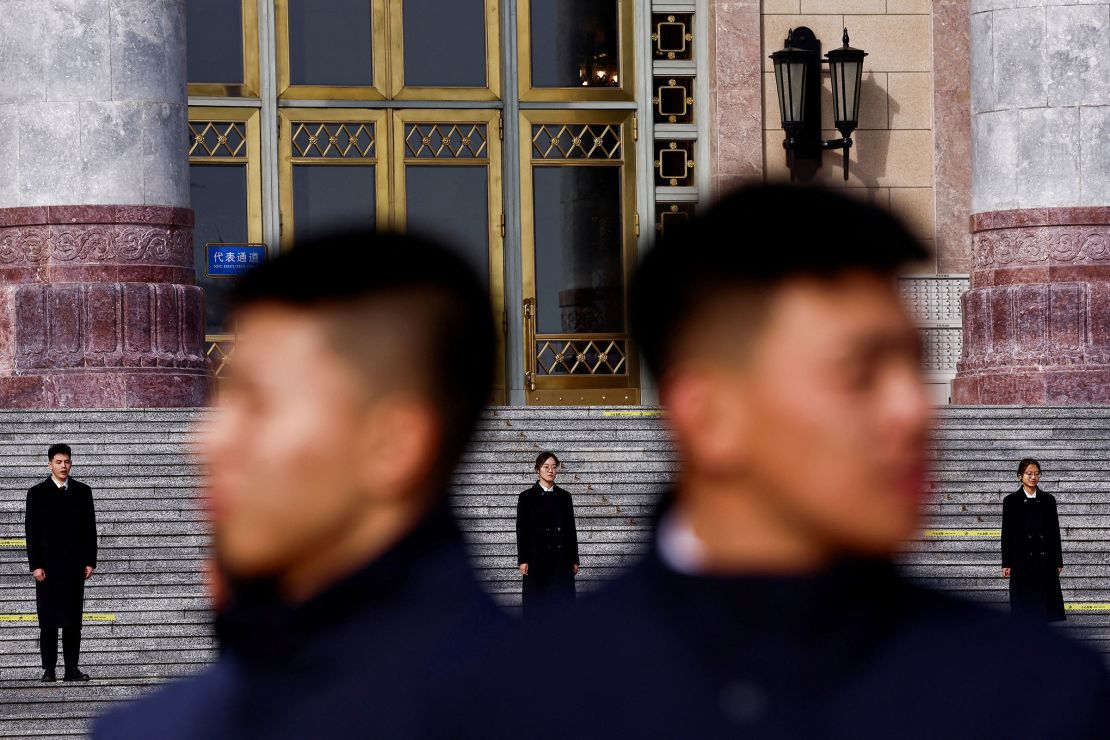
High stakes rivalry
But even as Chinese officials seek to project confidence, international observers say the economic stimulus measures announced this week show Beijing is girding itself for major challenges to come.
Premier Li alluded to that in his opening address. “The external environment is becoming more complex and severe, which may have a greater impact on the country’s trade, science and technology and other fields,” he said.
China doesn’t want to deal with that volatility while also grappling with a weak economy at home. That’s one reason why it’s trying to boost consumption and spur growth, setting an ambitious expansion target of “around 5%” this year. Beijing is also aware that trade frictions mean the economy needs to rely less on exports.
“It is likely that Beijing has thought through the scenarios of Trade War 2.0, but whatever happens, it is clear that China’s growth will have to rely more on domestic demand,” said Bert Hofman, a professor at the East Asian Institute at the National University Singapore and former World Bank country director for China, in a note.
Still, some analysts say Beijing’s initiatives are short on details and much less aggressive than needed to rev up the economy and boost consumer confidence.
“It adds up to a sense by the leadership that they want to refocus on growth and development, but still a desire to do only as much as necessary in terms of stimulus to get there,” said Michael Hirson, a fellow at the Asia Society Policy Institute’s Center for China Analysis.
Xi may also be balancing this goal with another concern: a need to save some firepower to support the economy if China faces “a nasty four years dealing with Donald Trump,” he said.
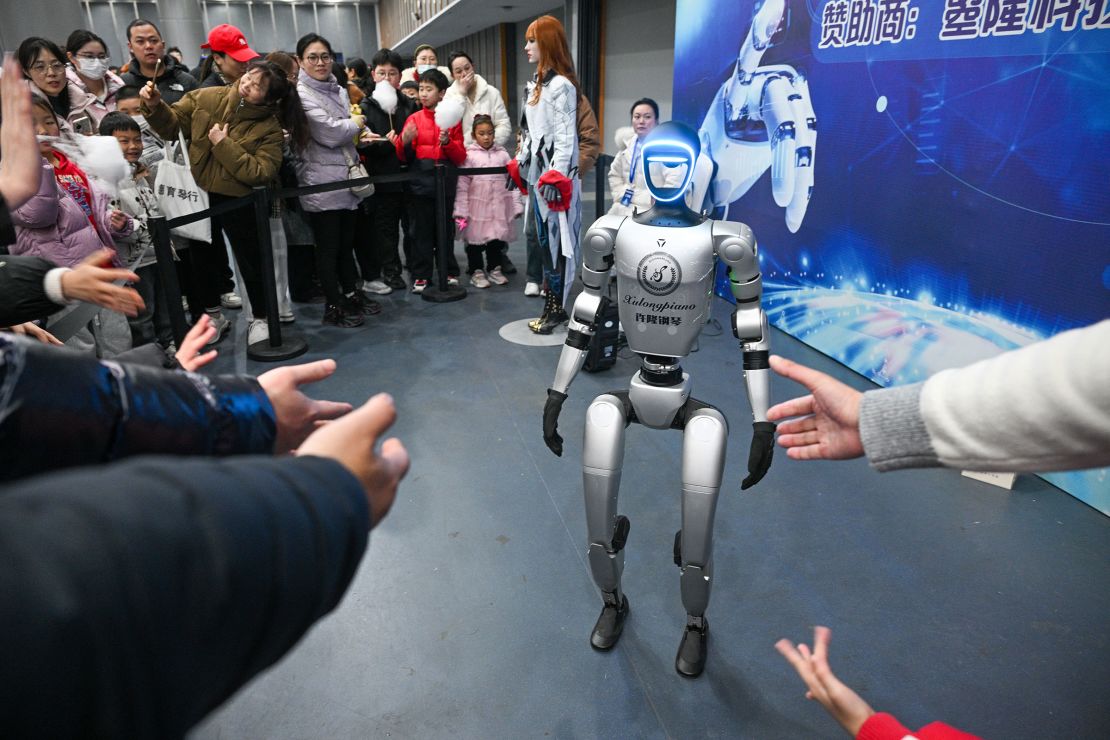
Beijing also wants to direct resources toward the high-tech transformation of its economy and industries. That’s another key part of the government’s 2025 agenda – and a long-term objective of Xi, who unlike US presidents is not subject to term limits on his leadership.
Beijing is pushing for innovations in AI, robotics, 6G and quantum computing, announcing a state-backed fund to support tech innovation and even welcoming foreign enterprises – in a significant tone shift for Xi – to play a role.
China is still smarting from the first Trump administration’s campaign to keep its tech champion Huawei out of global mobile networks and from the Biden administration’s efforts to convince allies to join it in cutting Chinese access to advanced semiconductors.
Last month, Washington said it was considering expanding restrictions on US investment in sensitive technologies in China.
But Beijing this week has also touted its confidence in advancing no matter the barriers.
“Be it space science or chip making, unjustified external suppression has never stopped,” Chinese Foreign Minister Wang Yi told reporters Friday. “But where there is blockade, there is breakthrough; where there is suppression, there is innovation.”
“We are witnessing an ever-expanding horizon for China to become a science and technology powerhouse,” he said.

The Trump threat?
How much Trump’s policies will challenge China remains an open and urgent question for Beijing.
The US president has refrained so far from slapping Chinese imports with the blanket 60% or more tariffs that he had threatened on the campaign trail.
He’s been focused elsewhere, including on unleashing sweeping changes to US global leadership by decimating US foreign assistance, threatening to take control of other countries’ sovereign territory, and upending US alliances in Europe, while pulling closer to Russia at the expense of Ukraine.
There are potential risks for Beijing in that shake-up. For example, if a Washington-Moscow rapprochement pulls Xi away from Russian President Vladimir Putin, his closest ally, or if an American dial-down of security in Europe allows it to ramp up attention on Asia.
But Chinese diplomats have also been taking advantage of the changes to play up their country as a responsible and stable global leader, despite criticisms of Beijing’s own aggressive behavior in Asia.
“A big country should honor its international obligations and fulfill its due responsibilities. It should not put selfish interests before principles, still less should it wield the power to bully the weak,” Foreign Minister Wang Yi said on Friday in response to a question from CNN on Trump’s “America First” policy. China “resolutely opposes power politics and hegemony,” Wang added.
When it comes to tariffs, observers say Beijing is trying to moderate its response, holding out for a potential meeting between Xi and Trump or perhaps even a deal that could avert an escalating trade war.
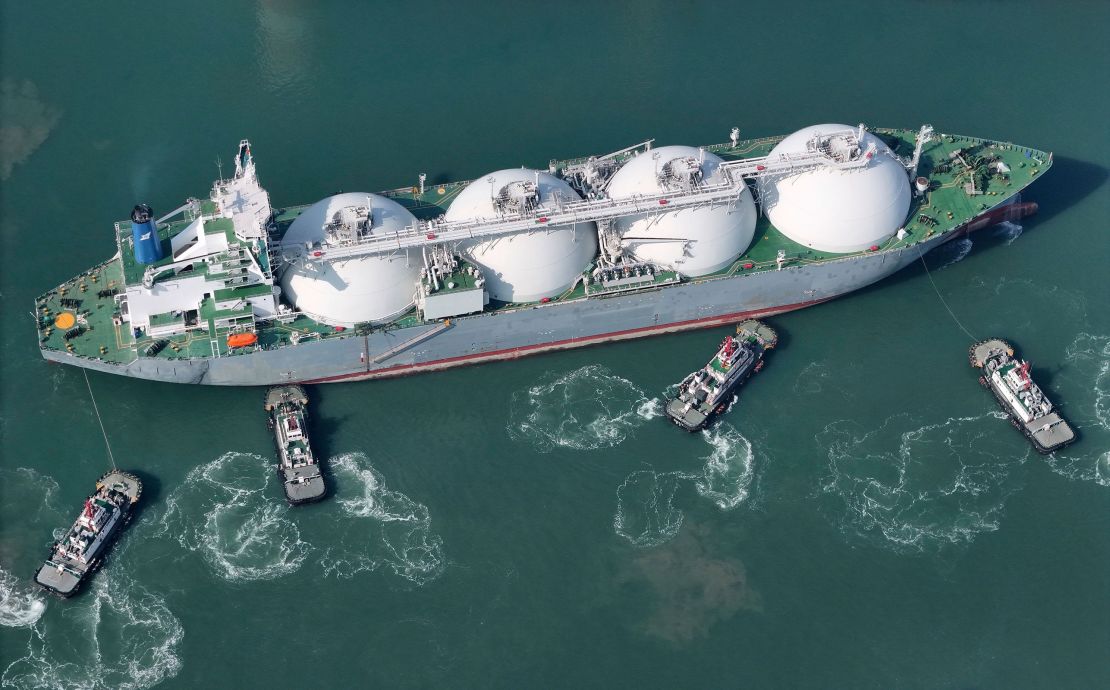
While China immediately retaliated against two sets of US tariffs this year, including with levies on US energy and key agricultural goods, it has remained measured in its reprisals.
The country’s deficit with the US means it will have less room to hit back if a trade war escalates, but Beijing is expected to be calculating other measures like export controls that it could use for leverage.
And the view from some parts is that even if tariffs cause the Chinese economy short-term pain, it will be the US which loses in the long run. China is still an indispensable part of global supply chains. It’s also better prepared to weather this trade war than the last one, because it’s sending goods to more markets globally now, data show.
“If you play (imposing tariffs) with a peer competitor, it actually would not work that well compared to if you’re doing this with small countries or medium powers,” said Zhou in Beijing, who is also the author of the forthcoming book “Should the World Fear China?”.
China, he said, wants cooperation not friction.
“But since the US is still the stronger side in this relationship, (it will) decide which kind of relationship this is … so China has to say ‘OK – if this has to be to be one of competition, then we must dare to fight,’” he said.










